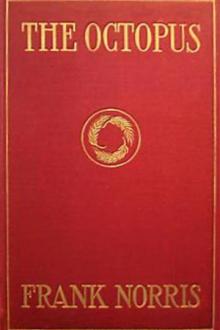The Octopus by Frank Norris (e manga reader .TXT) 📕

- Author: Frank Norris
- Performer: -
Book online «The Octopus by Frank Norris (e manga reader .TXT) 📕». Author Frank Norris
by the presence of certain immovable facts. Just what he wanted, Presley hardly knew. On one hand, it was his ambition to portray life as he saw it--directly, frankly, and through no medium of personality or temperament. But, on the other hand, as well, he wished to see everything through a rose-coloured mist--a mist that dulled all harsh outlines, all crude and violent colours. He told himself that, as a part of the people, he loved the people and sympathised with their hopes and fears, and joys and griefs; and yet Hooven, grimy and perspiring, with his perpetual grievance and his contracted horizon, only revolted him. He had set himself the task of giving true, absolutely true, poetical expression to the life of the ranch, and yet, again and again, he brought up against the railroad, that stubborn iron barrier against which his romance shattered itself to froth and disintegrated, flying spume. His heart went out to the people, and his groping hand met that of a slovenly little Dutchman, whom it was impossib
Free e-book «The Octopus by Frank Norris (e manga reader .TXT) 📕» - read online now
Similar e-books:





Comments (0)